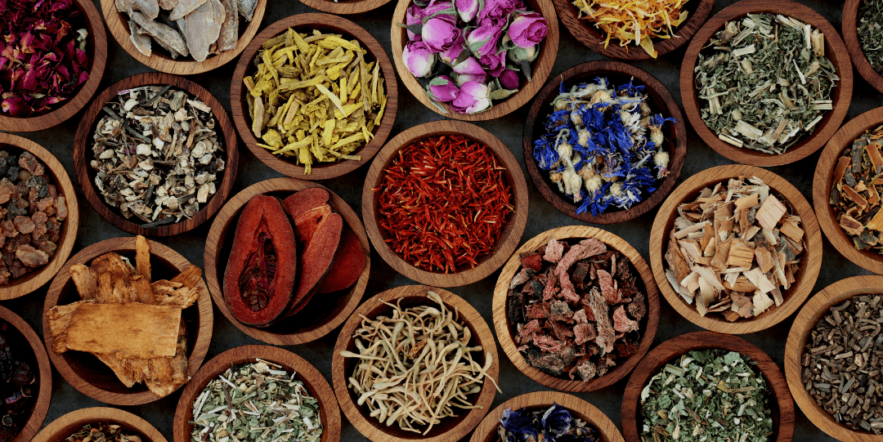For thousands of years, herbal remedies have been used in China as part of a holistic system of medicine. But today, renowned medical centers in the United States are starting to integrate Chinese herbs into their practices. Highly regarded institutions like the Cleveland Clinic, NYU Langone Medical Center and MD Anderson Cancer Center are broadening their practices to include herbal treatments to address such problems as digestive disorders, menstrual issues, joint pain and even cancer treatment. In some cases, the use of Chinese herbs has helped people rethink, reduce or even eliminate their dependence on pharmaceutical drugs, saving them from harmful side effects.
Mina Larson, 44, of Northern Virginia, was diagnosed with Crohn’s disease in 2013. Even though two separate gastroenterologists suggested she take either Humira (adalimumab) or Imuran (azathioprine) to treat her symptoms, Larson declined. Worried about the drugs’ side effects — which include a rare fast-growing, sometimes fatal form of lymphoma — Larson opted for a regimen that involved acupuncture, Chinese herbs, anti-inflammatory supplements and dietary changes. 2 years later, Larson still follows this drug-free program and her Crohn’s disease is in remission. Says Larson: “I started feeling better after a few days of herbal treatment; and after a month of dietary changes and herbs, I noticed a big difference in my health. I no longer was having pain, discomfort, bloating and diarrhea. Now, as long as I stick to my daily regimen, I am in remission.” (To read more of Larson’s story, see First Person: Chinese Herbs for Crohn’s Disease.)
Like Larson, more health consumers are looking to integrate Chinese herbs and other forms of non-pharmaceutical drug treatments into their medical care. In response to consumer interest, the MD Anderson Cancer Center, Northwestern Medicine’s Osher Center for Integrative Medicine and NYU Langone Medical Center’s Center for the Study & Treatment of Pain are now using Chinese herbs — along with traditional Western methods — to treat their patients. In January 2014, the Cleveland Clinic, one of the nation’s top hospitals, opened the Chinese Herbal Therapy Clinic as part of its Center for Integrative Medicine. “Patients often come to us with a chronic condition [such as pain or insomnia] that they haven’t been able to treat elsewhere,” says licensed acupuncturist and Chinese herbal therapist Galina Roofener, LAc. “This is their last resort.”
While gaining greater acceptance among some physicians and patients, Chinese herbs are still shrouded in mystery: What are they exactly? Where do you get them? Do they interfere with pharmaceutical drugs? And, most important, are they safe?
The “Science” Behind the Herbs
Chinese herbs are part of a system called Traditional Chinese Medicine (TCM) that uses its own forms of diagnosis, treatment, prognosis and therapy. Unlike Western medicine that focuses on a disease and its symptoms, TCM practitioners believe there is an underlying pattern of disharmony in the body. In simple terms, Chinese medicine views the body as an energetic system. One’s “qi” — energy or life force — flows in a regular pattern through 14 major channels or meridians to every part of the body, including its internal organs and tissues. When qi is blocked or imbalanced — due to poor nutrition; unbalanced emotions; environmental influences, such as pollution; injury to the body; or even the side effects of medications — disharmony and disease can occur.
TCM helps restore balance to the body through a combination of treatments, including acupuncture, herbal remedies, acupressure massage, food therapy/diet, energy-balancing exercises (such as qigong) and meditation. It can be used to to correct imbalances that lead to illness and pain, or to regulate imbalances before symptoms appear, thus strengthening the body’s resistance to disease. Chinese herbalists often consult a traditional Chinese medicine text that covers thousands of herbs, minerals and other extracts — and prescribe formulas that combine anywhere from 1 to 20 herbs. The herbs can be taken in the form of a tincture, tablet, capsule or concentrated powder mixed with hot water.
A Blend of East and West
In China today, practitioners use a combination of traditional and Western methods, such as drugs, surgery and radiation, to address symptoms and cure diseases. Likewise, there is a growing movement in the US to integrate the 2 systems of medicine. In 1998, the National Institutes of Health (NIH) created a National Center for Complementary and Integrative Health (NCCIH) to conduct and support research on the efficacy and safety of alternative medicines, including those rooted in traditional Chinese medicine. In 2019, the NCCIH had a budget of more than $146.5 million . (The NIH’s total budget for the year was approximately $40 billion.)
But despite the numerous studies conducted on Chinese herbs in Asia and other places around the world, the NCCIH maintains that many fall short of current Western scientific standards and lack evidence proving the herbs’ effectiveness. A recent article in The Wall Street Journal cites that “rarely are scientists expected to provide authentication of herbs they’re studying, which makes it difficult to know what’s really in the concoctions.” This makes it harder for other scientists to replicate the findings, explains Qihe Xu, a professor of renal medicine at King’s College London and co-director of King’s Centre for Integrative Chinese Medicine. On top of that, TCM can be difficult for researchers to study because its treatments are often complex and based on ideas that differ from those of modern Western medicine.
Still, Chinese herbs have helped — and are continuing to help — patients around the country, and in due time, new studies may prove their effectiveness. “As Chinese herbs become more officially recognized in the United States, I believe more research will be done,” says Roofener. “It’s a question of supply and demand.”
In the meantime, if you’re thinking of adding Chinese herbs to your healthcare regimen, consider the following 5 guidelines:
1. Choose a certified practitioner
The National Certification Commission for Acupuncture and Oriental Medicine (NCCAOM) maintains a registry of diplomates who have completed an in-depth course of study in Oriental Medicine, Acupuncture, Chinese Herbology or Asian Bodywork Therapy. Diplomates of Chinese Herbology complete 3 to 4 years of Master’s degree level education in an accredited Oriental Medicine or Chinese Herbology program — and must pass NCCAOM certification exams in Foundations of Oriental Medicine, Chinese Herbology and Biomedicine. Approximately 5,500 practitioners in the US are Diplomates of Chinese Herbology. There are also roughly 6,000 Diplomates of Oriental Medicine and 35,000 Diplomates of Acupuncture, some of whom are also certified to practice herbology. These practitioners will thoroughly assess your health situation before providing you with high-quality Chinese herbs if needed.
2. Verify that you are a good “candidate” for herbal therapy; some people should avoid it
During your initial consultation — which could last anywhere from 1 to 2 hours — your practitioner will take a detailed medical history, ask whether you’ve had any liver or kidney problems (since herbs are processed through these organs), and discuss whether you’re on any medication. Some drugs and herbs may not interact well with one another and cause complications. For example, a recent paper published in the Singapore Medical Journal reviewed the possible effects of 44 commonly consumed herbs and supplements on the blood thinner Coumadin (warfarin). Certain herbs — such as dong quai, danshen and licorice — were found to cause a higher risk of bleeding and clotting issues in patients using the drug. Cardiologists at the Cleveland Clinic also warn that Chinese herbs can have an effect on those taking heart medications such as Lanoxin (digoxin) as well as Lasix and other diuretics. (For a list of side effects, see this helpful chart.)
Ania Grimone, LAc, CH, an acupuncturist and Chinese herbalist at the Osher Center for Integrative Medicine at Northwestern University in Chicago, says that “herbs are chemical substances that functionally change and affect the biochemistry of the body.” As such, some herbs may increase or decrease the body’s absorption of a medication, while others may make it more difficult for a patient to clear a drug from the body, leading to a potential toxic buildup. For this reason, Grimone always cross-references the drugs and herbs she uses for safety and keeps a patient’s doctor abreast of any herbs she prescribes.
3. Be patient: Chinese herbs can be used for a variety of conditions — but may take time to work
Galina Roofener saw more than 150 patients during the year 2015 alone at the Cleveland Clinic’s Chinese Herbal Therapy Clinic for a wide range of conditions. For example, she has treated:
- Women with fertility issues (herbs can nourish the body, increase blood circulation in the uterus and help address any underlying health issues)
- Women with hormonal fluctuations as a result of PMS, menopause or estrogen-blocking breast cancer treatments (herbs can help regulate hormones and reduce hot flashes)
- Patients with side effects from medications such as opiates (for those with severe constipation, herbs can warm the kidneys, moisten the intestines and unblock the bowels).
Roofener has also seen patients with chronic pain; headaches; autoimmune diseases, such as MS and lupus; sleep disorders; Epstein-Barr virus; and gastrointestinal issues. In some cases herbs will be used in conjunction with acupuncture and other forms of TCM, as well as with Western methods, to treat the conditions. For example, Chinese herbs and acupuncture on their own will not cure fibromyalgia (a disease characterized by widespread muscle pain and tenderness), and a patient may still need to take medication. But herbs and acupuncture can help promote healing by improving blood circulation and reducing systemic pain and inflammation.
Ania Grimone of the Osher Center for Integrative Medicine maintains that herbs are not a quick fix. “Herbs are very effective and safe when taken under supervision, but they do require patience,” she says. “They are part of a holistic approach to medicine. Depending on how long someone has had an illness — and its severity — it can take 1 month to more than 1 year to resolve.”
4. Only purchase Chinese herbs from a reputable source since their quality can vary significantly
The New York State attorney general’s office accused GNC, Target, Walgreens and Walmart of selling fraudulent and potentially dangerous herbal supplements in 2015. After conducting tests on several top-selling store brands, authorities found that many of the products did not contain any of the medicinal herbs listed on their labels. Instead they consisted of cheap fillers like powdered rice, asparagus, houseplants and wheat — a well-known allergen. One reason for the problem is that the FDA does not apply the same strict approval and regulation process to herbal supplements as it does to prescription drugs. Commercially sold herbs are classified as dietary supplements (as are vitamins).
By contrast, certified herbal practitioners maintain that they purchase their herbs from reputable distributors. Roofener says she has prescribed more than 29,750 doses of herbs to 157 patients at the Cleveland Clinic’s Chinese Herbal Therapy Clinic and has seen only 3 people complain of mild side effects, such as itching. What’s more, trained herbalists can adjust or alter an herbal formula, based on a patient’s need or response to it.
But as with many products, let the buyer beware. Consumers can ask about the source of the herb and its safety record. Herbs manufactured in the US will have to meet the country’s strict manufacturing standards.
5. Include cost as a treatment factor since Chinese herbs can be costly
Some insurance companies may cover the cost of acupuncture but they won’t cover the fees for a Chinese herb consultation or the herbs themselves. Prices will range based on the practitioner’s location and the amount, complexity and potency of herbs prescribed. At the Cleveland Clinic’s Chinese Herbal Therapy Clinic, for example, an initial 1-hour exam costs $150. Each 30-minute follow-up visit costs $75, with herbs running between $60 and $150 a month. At the Osher Center for Integrative Medicine, an initial 1-hour consultation, followed by a 30-minute acupuncture session, costs $130. Follow-up visits are $90. Grimone prescribes herbal tinctures that cost between $12 and $17 for a 10- to 14-day supply. In areas such as New York City, prices for initial appointments could cost up to $400 and follow up appointments range from $50-$200.
Chinese Herbs: A Complement to Cancer Treatment
Amy Sear, A.P., Dipl. O.M., owner of Sear-Enity Natural Medicine, maintains that while Chinese herbs are not a cure for cancer, they can help at every step of the treatment process. Since 2002, Sear has worked with breast oncologists, and for the past 10 years has seen patients at the Breast Cancer Centers of Memorial Cancer Institute at 2 sites in Florida — Hollywood and Pembroke Pines. According to Sear, when used along with acupuncture and other modalities, such as massage, Reiki and nutritional supplements, herbs can help:
- Support digestion and boost the body’s immune system in preparation for chemotherapy
- Reduce the side effects of chemotherapy, including fatigue, nausea, insomnia and lower blood cell counts
- Reduce pain and inflammation and facilitate healing before or after surgery
- Detoxify and heal the body after chemotherapy, while building stamina, strengthening the immune system and reducing the likelihood of the recurrence of cancer.
Karis Whillans, 53, of Fort Lauderdale, has been a patient of Sear’s for about 2 years. Whillans began chemotherapy in 2012 for breast cancer but was unable to finish a second round of treatment when she developed congestive heart failure. When Whillans’ doctors put her on letrozole — a nonsteroidal aromatase inhibitor used to help decrease the amount of estrogen produced by her body — Whillans had sudden, severe side effects. Her joint pain was so debilitating “I felt like a tinman,” she says, describing her stiffness and lack of mobility.
Working with Sear, Whillans set up a program of acupuncture, herbs and supplements to offset the side effects of letrozole. Today, she receives acupuncture about once a month; takes a number of daily supplements and vitamins, including turmeric, black currant oil, fish oil, B12 and zinc; and uses a formula called Zyflamend that contains 10 herbs with anti-inflammatory properties. Whillans takes two Zyflamend capsules in the morning and two at night. The result? “Within 1 month, I was able to walk three to four miles a day. Now I can do Pilates for an hour, three to five days a week,” notes Whillans. “Taking herbs is a slow process — results don’t happen overnight,” she adds. But Whillans is keenly aware of those results. At one point, in an effort to simplify her life, she decided to stop using her herbs and supplements, but her joint pain returned with a vengeance. “It was incredibly bad,” she recalls.
Despite the costs and other considerations, Chinese herbs can be an important part of an integrative health care arsenal. The important thing is to choose a certified practitioner who will carefully monitor your condition and supply you with quality herbs.






